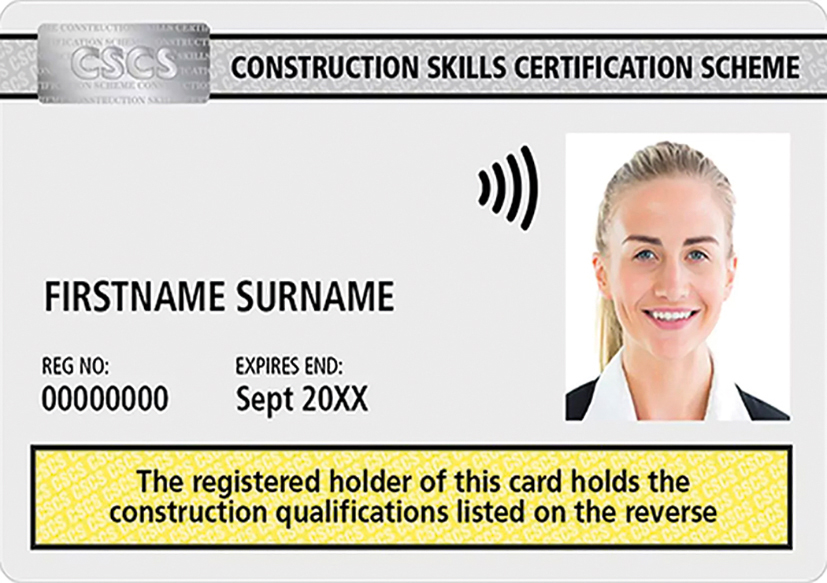New plans for accreditation in the construction sector could bring both benefits and challenges
Change is afoot in the construction industry, with alterations to the system for worker accreditation soon to come into effect.
This approach, known as Industry Accreditation (IA), is a mechanism where the Construction Skills Certification Scheme (CSCS) issues cards on the back of an employer’s recommendation, rather than on the achievement of a qualification.
Holding a CSCS card is not a legislative requirement; it is up to the principal contractor or client on projects whether workers need a card to be allowed on site.
However, most principal contractors and major housebuilders do require workers to hold a valid card.
Expiry date
CSCS stopped issuing new cards under IA in 2010 but, until now, those with cards issued before 2010 could renew them every five years.
However, in 2019, the CSCS announced that from January 2020 all cards issued under IA would expire at the end of 2024, with renewal no longer possible.
This is to keep in line with the Construction Leadership Council’s (CLC) One Industry Logo action, which requires industry card schemes to operate with nationally recognised qualifications in place for all occupations.
Introduced in 2015 and updated in 2017 and 2020, the CLC recommendation set an expectation of all CSCS cards being achieved via qualification, with the December 2024 deadline established.
CLC statement
A CLC spokesperson explains: “In 2015, the CLC announced that the industry, including trade associations, contractors and clients would specify and promote card schemes displaying the CSCS logo with no equivalents accepted. This is known as the One Industry Logo action.”
The spokesperson adds that the new approach has “made a positive contribution, both to the construction industry and the clients it serves”, helping “to ensure workers are qualified in the occupations that they will undertake and promote higher standards of health and safety in construction”.
Overall, they say, the decision “to standardise the approach to construction skills certification” aims to “improve standards of safety and competency on construction sites”.
The CLC spokesperson adds: “An industry-wide standard of competency linked to a single brand and logo provides clients, employers, and contractors with a consistent means of recognising that an individual has achieved the agreed standard of qualification and skill in their specific occupation.”

Brain drain
However, Tim Jones MCIOB, principal lecturer at the Department of the Natural and Built Environment at Sheffield Hallam University, is concerned that the change may lead to a “brain drain”, with workers more likely to look for employment in other industries.
He explains: “There have already been a number of people leaving the industry. At a trade level, a lot have thought ‘I can work in an allied trade or work for myself. I don’t need this accreditation or formal qualification’.
“Covid was a trigger as well. Those getting to the end of their careers thought ‘I’ve had enough’.”
According to CSCS head of communications Alan O’Neile, the CSCS understands the concerns. He emphasises that “no one wants these individuals to leave the industry”, adding that “their knowledge and skills are incredibly valuable”.
He continues: “This is why the industry has announced a package of support to ensure the process of achieving the qualification is as straightforward as possible.
“Contrary to a popular misconception, individuals will not need to return to college to achieve qualifications.
“Assessment methods are available and can be carried out remotely or in the workplace. The assessment route should be a relatively straightforward process for an experienced worker to achieve.”
What’s next?
How the new process will work will depend on the specific construction occupation and any construction-related qualifications already held.rnrnTo apply for a skilled level CSCS card, an applicant must hold a nationally recognised construction-related qualification. As well as NVQs, the CSCS accepts other qualifications, which are listed on its u003ca href=u0022https://eur02.safelinks.protection.outlook.com/?url=https%3A%2F%2Fwww.cscs.uk.com%2Fapplying-for-cards%2Fqualifications%2Fu0026amp;data=05%7C01%7CConstruction.Enquiries%40beis.gov.uk%7C7c6c83fddf7f43e55daa08db254736d1%7Ccbac700502c143ebb497e6492d1b2dd8%7C0%7C0%7C638144760006284830%7CUnknown%7CTWFpbGZsb3d8eyJWIjoiMC4wLjAwMDAiLCJQIjoiV2luMzIiLCJBTiI6Ik1haWwiLCJXVCI6Mn0%3D%7C3000%7C%7C%7Cu0026amp;sdata=twvwqYHlESEXnGT%2Blll%2Fr45TCJLYNO7n%2FbzwgZDO68w%3Du0026amp;reserved=0u0022u003ewebsiteu003c/au003e. For example:rnu003culu003ern tu003cliu003eAcademically Qualified Person Card: This card is available to people who have completed certain construction related degrees, HNDs, HNCs, CIOB certificates and NEBOSH diplomas.u003c/liu003ern tu003cliu003eProfessionally Qualified Person Card: This card is available to competence assessed members of CSCS-approved professional bodies.u003c/liu003ernu003c/ulu003ernWhere a person has moved into an office-based job, become a director or rarely visits site, a CSCS card will not be required.rnrnThose without qualifications will be required to register for the appropriate qualification for their occupation before their cards expire in 2024.rnrnThe guidance issued by CSCS notes that those needing to obtain a qualification do not need to attend college. The SVQ/NVQ (S/NVQ) can be achieved via u003ca href=u0022https://eur02.safelinks.protection.outlook.com/?url=https%3A%2F%2Fwww.cscs.uk.com%2Fapplying-for-cards%2Findustry-accreditation%2Findustry-accreditiation-faqs%2Fu0026amp;data=05%7C01%7CConstruction.Enquiries%40beis.gov.uk%7C7c6c83fddf7f43e55daa08db254736d1%7Ccbac700502c143ebb497e6492d1b2dd8%7C0%7C0%7C638144760006284830%7CUnknown%7CTWFpbGZsb3d8eyJWIjoiMC4wLjAwMDAiLCJQIjoiV2luMzIiLCJBTiI6Ik1haWwiLCJXVCI6Mn0%3D%7C3000%7C%7C%7Cu0026amp;sdata=hWBpJJimxSsclqhdUKHkwOpnTx4m2KYFbkgYb8ee%2B0I%3Du0026amp;reserved=0u0022u003evarious routesu003c/au003e. The assessment is completed in the workplace and in many cases remotely. There are many ways to show evidence of competence, including:rnu003culu003ern tu003cliu003eA professional discussionu003c/liu003ern tu003cliu003eKnowledge evidence questionsu003c/liu003ern tu003cliu003eReflective accountsu003c/liu003ern tu003cliu003eWitness testimonies (confirming previous workplace activities undertaken)u003c/liu003ern tu003cliu003eProduct evidence – for example, minutes of meetings, RAMS, products of worku003c/liu003ern tu003cliu003eObservationsu003c/liu003ernu003c/ulu003ernIndividuals should use the interactive flowcharts available at u003ca href=u0022https://www.cscs.uk.com/applying-for-cards/industry-accreditation/u0022u003eCSCS.uk.com/IA u003c/au003e to work out their route off IA.
Extra funding
Enhanced CITB grant funding is also available to employers to support those individuals who need to undertake further assessment to achieve a qualification: £1,250 for supervisory qualifications and £1,500 for managerial qualifications.
In addition, O’Neile says that for “many IA cardholders”, replacing cards should be a “straightforward process” – for example, by moving across to the Academically or Professionally Qualified Persons cards or using an existing qualification to renew. Those who no longer attend site or are in non-construction-related occupations will not require a card.
Transition plan
On a logistical note, a Build UK spokesperson emphasises that “companies and individuals should put a plan in place to transition their staff as soon as possible, but no later than the end of 2024”.
The spokesperson continues: “If a new qualification is required, workers should register as soon as possible to ensure enough time to achieve the qualification, and also to avoid a surge in demand close to the deadline.”
However, Jones feels that some people who need a card “won’t get themselves onto an approved training scheme either because they’re self-employed and can’t afford it or they can’t be bothered”.
He adds: “So they will lose their trade status and be told they can’t work or they’ll go somewhere else because they don’t want to go through the process.
“Your average self-employed person can’t get access to the CITB funding because it is only available to companies who pay a levy to the CITB. So, it’s all smoke and mirrors.
“Most of the large organisations that pay into the CITB are management-only companies. [A lot of these large organisations] don’t employ any labour, it’s all done through subcontractors, so there’s still a huge prevalence in the construction industry of tradespeople being self-employed.”
Cowboy culture
According to Jones, this could lead to a return to “cowboy culture”.
“How do you prove your competence?” he asks. “Because people will invent a scheme to get around the problem and that doesn’t help the industry going forward”.
In response, O’Neile says: “Those self-employed or subcontracted on projects should speak to the primary contractor in the first instance regarding grant funding.
“It is not uncommon for primary contractors to support the self-employed in achieving a qualification.”
Will the changes help?
Going forward, Jones feels that the changes will not help the industry’s “chronic skills shortage”.
“We need to make [the industry] look more attractive to people so they want to join,” he says.
“This is going to hit the industry like a bit of a sledgehammer in the face because we could have lots of sites looking for labour as people haven’t renewed their status and they’re leaving the industry.”
As the 2024 date moves closer, the CSCS maintains that the switch will be a positive move.
“The removal of IA is the last in a number of changes that have taken place in recent years that have seen over half a million unqualified construction workers obtain a recognised qualification,” O’Neile says.
The Build UK spokesperson adds: “New regulation following disasters such as the Lakanal House and Grenfell Tower fires has brought competence to the forefront for the construction industry.
“The changes for IA ensure that cards bearing the CSCS logo comply with this recommendation and allow employers, clients and regulators to have confidence in the competence of those working in the industry.” With competence clearly a key driver for the industry, time will tell whether the accreditation changes will be an effective way to increase confidence and guarantee compliance.








